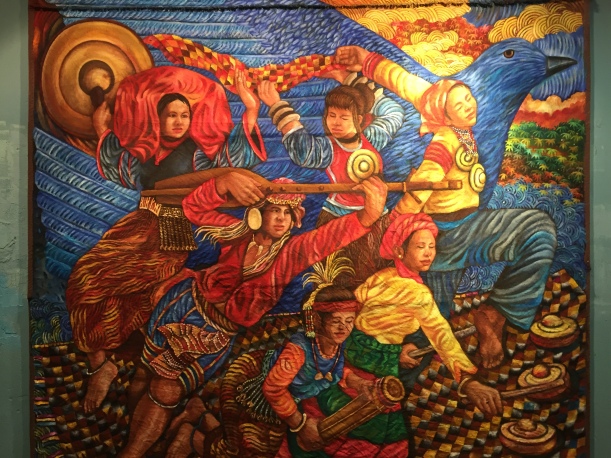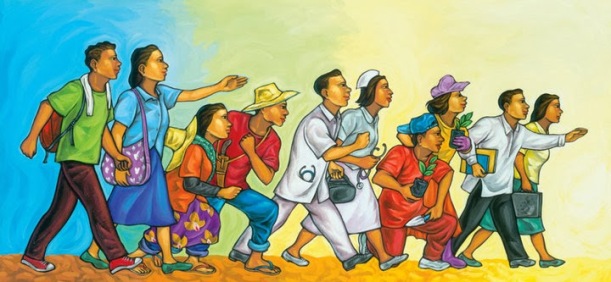
Culture pf Peace by Bert Monterona
December 16, 2016
Isaiah 56: 1: 3a-1-3a, 6-8
Responsorial Psalm: Psalms 67: 2-3, 5, 7-8
Gospel: John 5: 33-36
SALVATION IS JUST AROUND THE CORNER (The Message)
1-3a God’s Message:
“Guard my common good: Do what’s right and do it in the right way, for salvation is just around the corner, my setting-things-right is about to go into action.
How blessed are you who enter into these things, you men and women who embrace them, who keep Sabbath and don’t defile it, who watch your step and don’t do anything evil! Make sure no outsider who now follows God ever has occasion to say, ‘God put me in second-class. I don’t really belong.’
6-8
“And as for the outsiders who now follow me, working for me, loving my name, and wanting to be my servants—All who keep Sabbath and don’t defile it, holding fast to my covenant—I’ll bring them to my holy mountain and give them joy in my house of prayer. They’ll be welcome to worship the same as the ‘insiders,’ to bring burnt offerings and sacrifices to my altar.
Oh yes, my house of worship will be known as a house of prayer for all people.” The Decree of the Master, God himself, who gathers in the exiles of Israel: “I will gather others also, gather them in with those already gathered.”
John 5:33-36 (The Message)
33 Furthermore, you all saw and heard John, and he gave expert and reliable testimony about me, didn’t he?
34-36 “But my purpose is not to get your vote, and not to appeal to mere human testimony. I’m speaking to you this way so that you will be saved. John was a torch, blazing and bright, and you were glad enough to dance for an hour or so in his bright light. But the witness that really confirms me far exceeds John’s witness. It’s the work the Father gave me to complete. These very tasks, as I go about completing them, confirm that the Father, in fact, sent me. The Father who sent me, confirmed me.
In this season of advent, there are many things to think about regarding the meaning and significance of the coming of the Messiah in our midst.
The word ‘advent’ comes from the Latin word “adventus”, which means ‘to come’ or ‘appear’. The celebration of Advent is more than just a marking of a 2,000 year-old event where the historical coming of Jesus was proclaimed by the prophets and angels but also of the second coming in the fullness of time. (http://wernerbiblecommentary.org/)
The biblical texts for today’s reflection especially the one coming from Isaiah 56: 1-3a started with two commands: 1) preserve justice and; 2) do righteousness. The need for such admonition suggests that justice and righteousness were lacking in the community during the Old Testament times. So Yahweh was reminding the religious leaders to do these 2 important commands. Those who were faithful were blessed. “Blessed are those who uphold justice and righteousness.” The word “blessed” denotes to be in a state of well-being (wernerbiblecommentary.org). This desirable condition is the promised possession of all who uphold justice and live uprightly, for they would be recipients of YHWH’s love, aid, and protective care.
The reason for these two basic commands is that salvation is at hand and God’s righteousness is about to be revealed. Acting in a just and fair manner is always in agreement with God’s commands. As we wait for God’s final deliverance, Christians are called to uphold justice and do righteousness at all times.
In Isaiah 56:3a, God has instructed the religious leaders that those who now follow Him especially the foreigners who were normally excluded in the temple will now be included in the place of worship. Everybody is welcome and they must not feel discriminated on the basis of their social status. Nobody is left out in the church worship. Constantly reminding us to be conscious of our actions, giving importance to people whoever they are and wherever they are. Christians are called to an attitude and lifestyle closer to God. As God’s people, we are called through right and ethical behavior to welcome the strangers in our midst. The message of prophet Isaiah with regard to foreigners was clear. Isaiah asked the question: “Who are the servants of Yahweh?”. In Isaiah 56:6-7a, it was clear that he was referring to foreigners who joined themselves to the Lord to minister to him, to love the name of the Lord and to be his servants. God will bring them to His Holy Mountain, will make them joyful in His house of prayer, will accept their sacrifices and will gather them and others. Israelites are reminded to be an open community for the non-Israelites. Religious leaders apparently follow certain laws of the Torah but neglect this more important one. We are called to welcome in our midst the foreigners and strangers, and to ensure that they are not treated as second-class citizens within the church and our community.
In verse 8, YHWH is represented as gathering the Israelites who had been driven away, banished, or dispersed from their lands. Yahweh’s promise to return to their lands was an expression of Yahweh’ righteousness, for it would be a revelation of his justice in acting for his repentant people. It was a revelation of his compassion for them by restoring them to their land and to his favor.
In John 5:33-36, just like the religious leaders in Jesus times, John had paved the way for the coming of the Messiah but still nobody believed him. Jesus came asserting his place in the Kingdom as the Son of God, and yet many people did not believe Him. The voice of God, and the presence of the Holy Spirit had proclaimed that ‘This is the beloved Son, in whom the Father is well pleased.’ And yet people turned their backs to acknowledge God’s Lordship.
Jesus was exposing the hypocrisy of the Jews. There was no love of God and their neighbors. Their religious zeal was in vain because of their sinful pride. Once again, Jesus was rebuking them that they did not have God’s word abiding in them because they failed to believe in Him in spite of all the evidences pointing that He was the promised Messiah. Jesus was reaching out to save the lost, only to be rejected by them. However, it was very encouraging that ordinary people do believe and experienced the wonderful blessings of salvation in Jesus Christ. Those who put faith in Him were forgiven from their sins and they were gathered to God as reconciled members of God’s family.
THE NOW MESSAGE
We can find parallelism between what is happening with the Israelites people and in our own present context. The call of Yahweh to uphold justice and do righteousness continue to resonate even in our times where both the religious leaders and those who were bestowed with authority to rule forgot these 2 basic tenets. As Yahweh proclaimed salvation to those who repent, the promise of blessings and bounty was there. As lands were restored back to the people who were exiled, banished and dispersed, the people experience the fullness of God’s salvations and deliverance.
Advent is a call for repentance so that the people might experience justice and righteousness. Isaiah has depicted what will happen to those who believed in God. They will be received with all the honors and their offerings will be accepted. It is a situation where Shalom can be fully experienced by those who believed in God’s reign.
God had already shown us the way to peace. But what is happening with our indigenous communities, in the countryside, and in the cities are manifestations of our unrepentant and unyielding spirit. Acts of injustice continue to wreck havoc in the lives and survival of our indigenous brothers and sisters. Those in the position of authority continue to wield power to exploit the poor. The case of the Lumads, the Moro, and other national minorities was a concrete manifestation of defiance against the rule of Yahweh, where God has reminded us to embrace and accept them with love. God has restored the scattered Israelites back to their lands. The Lumads and the rest of the indigenous communities who were displaced because of mining operations, logging concessions, development projects, and militarization must also be restored back to their lands. They have suffered long enough. Their families, their women and children have witnessed the pain and agonies of war, of hunger, of death and separation from loved ones, and the lack of security. Day and night, they are crying out to God to make things right and to put death’s dark shadow into flight. But the leaders are deaf from their cries. Their hearts showed no compassion. They are blinded by their selfish interests. God has been calling us to repent and to turn from our wicked ways. This is the message of Advent. “For I, the Lord love justice; I hate robbery and wrong; I will faithfully give them their recompense, and I will make an everlasting covenant with them, thus says the Lord in Isaiah 61:8. When justice is done, it is a joy to the righteous but terror to evildoers (Prov. 21:15). But as long as the people wallow in pain and economic hardships, as long as families get separated to work overseas for economic relief, as our young women cry out for freedom from oppressive and exploitative employers, as workers seek for just living wages, as farmers demand for their lands, as the indigenous and Moro peoples cry out for self-determination, and as leaders show wanton disregard for the rights and welfare of others, God’s commands to uphold justice and do righteousness are not yet fully realized.
People who are on the margins desire for peace and justice. They fought hard to pursue peace and justice. Being at the margins, and struggling for survival, they are the ones closer to God as they cry out day and night and hope that justice will finally reign in their lands. Salvation is always offered to each one of us. What we need to do is to accept God’s deliverance and God’s reign into our hearts and into our society. And for those who continue to wait for God’s final reign, must do good, preserve justice, and uphold righteousness. It is in this context that we as people of God are so persistent and faithful to the cause of justice and righteousness. That’s what God ultimately envisions for the world in the last days. “Nation will not take up sword against nation, nor will they train for war anymore. Everyone will sit under their own vine and under their own fig tree, and no one will make them afraid, for the Lord Almighty has spoken” (Micah 4:3–4).
Salvation is just around the corner. We need to be mindful of God’s abiding presence. Jesus has come and is coming again. In this spirit of advent, God is calling us to repentance and a change of attitude and lifestyle. As people of God, let us continue to seek peace, pursue justice, and uphold righteousness.
Come Emmanuel, bring us wholeness of life.
Come Emmanuel, lead us to Shalom!
Come Emmanuel, help us to be faithful in bringing Shalom. ##
Dr. Angie B. Broncano, PhD
Deaconess – United Methodist Church
Antipolo, Rizal






 ing: Song 2: 8-14 or Zephaniah 3: 14-18a
ing: Song 2: 8-14 or Zephaniah 3: 14-18a

 Kanino Ka papanaig?
Kanino Ka papanaig?
